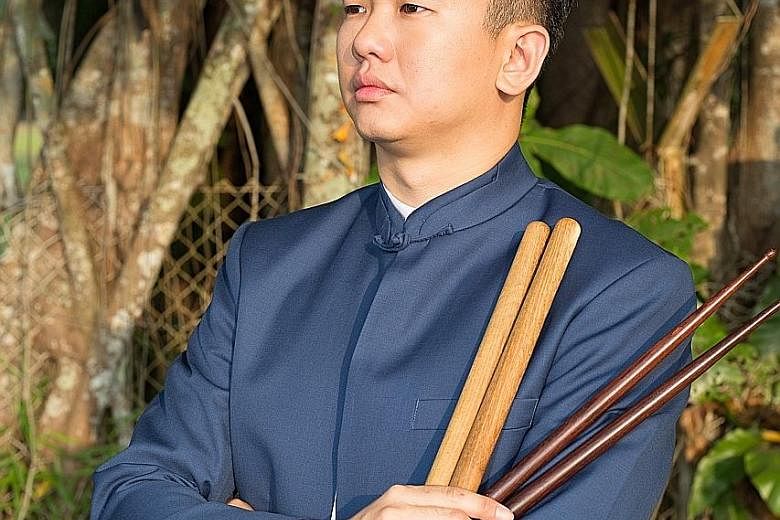Percussionist Eugene Toh's foray into the world of music began in secondary school, when he joined the Chinese orchestra.
"I chose to study percussion because of the cool factor. There's just something about playing the drums that appeals to a young mind," he says.
"But as I learnt more about it, I found the way it connects me to my inner self a reason to continue. The satisfaction I get from playing with other percussionists, who are grooving along to the same beat while being totally absorbed in the rhythms, is indescribable."
Toh, 33, will be one of the five musicians from Chinese chamber music ensemble Ding Yi Music Company to share the stage with a quintet from Vietnam's Song Hong Chamber Music on Sunday at the Victoria Concert Hall in a performance titled 5+5=?.
The show is part of the Singapore International Festival of Music.
-
BOOK IT / 5 + 5 = ?
-
WHERE: Victoria Concert Hall, 9 Empress Place
WHEN: Sunday, 5pm
ADMISSION: $32 to $72 from Sistic (call 6348-5555 or go to www.sistic.com.sg)
You started playing percussion in a Chinese orchestra. Have your tastes changed?
In secondary school, I listened to mostly Chinese and Western classical music, but I was more interested in developing my Chinese percussion skills. The only non-Chinese instrument I had an interest in then was the timpani, which I also played.
After my national service, I started developing an interest in Western percussion instruments I was less familiar with, namely the snare drum and mallet percussion.
After I graduated from Nanyang Technological University, I studied Western classical percussion at the Nanyang Academy of Fine Arts (Nafa) under Mark Suter, who is an avid hand drummer. That led me to explore various Middle Eastern percussion instruments such as the riq and tar. I also began exploring the South Indian mridangam and kanjira at the Temple of Fine Arts under Sri D. Rajagopal.
After graduating from Nafa, I studied the Middle Eastern darbuka and frame drum with Israeli percussionist Yshai Afterman via Skype.
It's amazing how modern technology can help with learning - geographical boundaries are no longer a problem, making it possible to study with experts around the world.
How do people react when you tell them you are a percussionist?
They are sometimes surprised, mainly because they think percussionists are just drummers, which brings to mind certain images that are not consistent with someone like me. They also seem to expect percussionists to be outspoken and loud, but in truth, most percussionists I know are soft-spoken.
Are there challenges or experiences unique to percussionists?
The first thing most people realise on trying to play any percussion instrument is that it is usually not as easy as it looks. It takes several years of training and a surprising amount of mental focus just to play seemingly simple rhythms to fit the musical context, both on a technical and artistic level.
My advice for those who are playing percussion instruments is to continue to try to develop nerves of steel because most percussion instruments are clearly audible in a performance.
For those who are thinking of picking up percussion, I think they should readily take that leap of faith. It will possibly be one of the best experiences of their lives.
Do you have any pre-show rituals?
I don't have any pre-show rituals, but I avoid coffee and carbonated drinks a few hours before a concert, as caffeine tends to interfere with my mental focus. I usually run though tricky sections of the music in my mind and attempt to visualise the playing, as a mental rehearsal.
Do you still have on-stage jitters? How do you get over them?
I usually feel the jitters only in the first five minutes or so of a concert. After that, I'm mostly in control.
Getting past the nervousness has a lot to do with being absorbed in the music and simply focusing on what I aim to express.
I find that it's also useful to stop thinking of having to go on stage to put on a perfect performance, as perfection is usually not the reason we play music.
Instead, I try to remind myself that I am there to share the music with the audience. After several days of hard work practising and rehearsing, usually the technical aspects of the playing will be taken care of.
I just have to remind myself to enjoy the performing.


